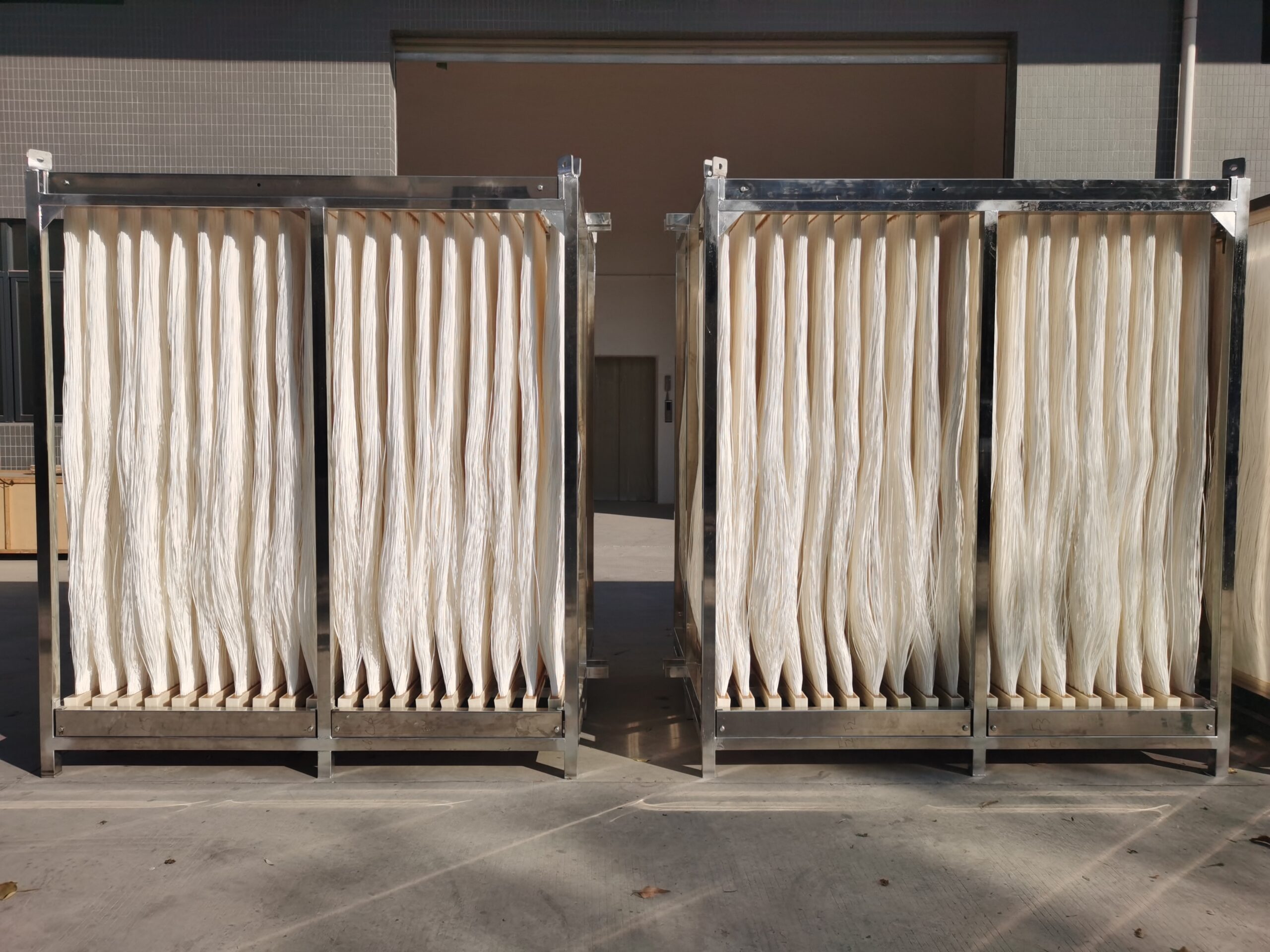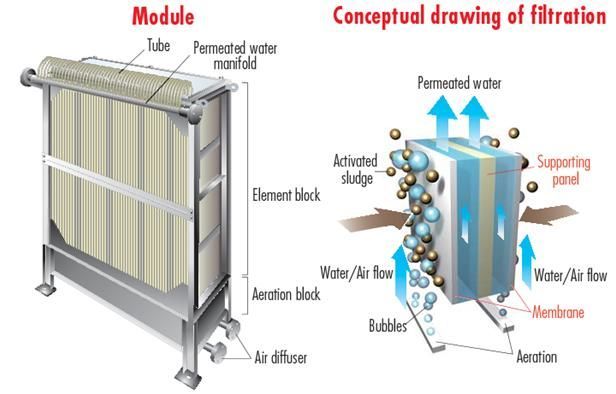How Membrane Bioreactor Can Help Meet Stringent Environmental Regulations
Wiki Article
Membrane Bioreactors Described: Efficient Solutions for Clean Water
Membrane layer bioreactors (MBRs) have actually emerged as an advanced remedy for dealing with the pushing obstacles of wastewater therapy - Membrane Bioreactor. By integrating biological procedures with advanced membrane layer purification, MBRs not only boost the quality of treated water yet also lower the spatial requirements of treatment centers.
What Are Membrane Layer Bioreactors?
Membrane layer bioreactors (MBRs) are sophisticated wastewater treatment systems that integrate biological degradation procedures with membrane layer filtering innovation. This integration enables the reliable elimination of pollutants from water, making MBRs a favored choice in numerous applications, consisting of community wastewater treatment and commercial effluent management.
Among the vital benefits of MBRs is their capability to produce premium effluent, commonly ideal for reuse in watering or industrial procedures. Furthermore, MBRs require a smaller sized impact contrasted to conventional therapy systems, making them ideal for urban setups where room might be restricted.
In addition, MBRs can properly deal with differing influent lots and are much less at risk to the results of hazardous shocks. These features add to their expanding appeal as a lasting solution for attending to the increasing need for tidy water while reducing environmental influences.
Exactly How Membrane Bioreactors Job
While the operation of membrane layer bioreactors (MBRs) may seem facility, it fundamentally focuses on the harmony in between biological processes and membrane filtering. MBRs integrate an organic treatment process, generally turned on sludge, with a membrane separation unit to treat wastewater efficiently.In an MBR system, wastewater is very first presented into a bioreactor where bacteria degrade raw material and other pollutants. The organic task reduces the concentration of pollutants while promoting the development of biomass. Following this biological therapy, the blended liquor is subjected to membrane layer filtering, which can be microfiltration or ultrafiltration, depending upon the preferred effluent high quality.
The membranes act as a physical barrier, allowing water and little solutes to pass while maintaining suspended solids and bigger molecules. This allows the system to preserve a high focus of biomass within the reactor, enhancing the treatment performance.
Furthermore, the constant separation of treated water from the biomass facilitates a portable layout and decreases the impact of the therapy facility. On the whole, the mix of biological deterioration and membrane layer filtration in MBRs causes reputable and efficient wastewater treatment, making certain high-grade effluent suitable for numerous applications.
Advantages of MBR Modern Technology
One of the vital benefits of membrane layer bioreactor (MBR) technology is its ability to create premium effluent with a significantly minimized impact compared to conventional wastewater therapy techniques. MBR systems successfully combine biological treatment and membrane filtration, resulting in superior elimination of impurities, consisting of suspended solids, virus, and raw material. This capacity results in effluent that commonly satisfies or exceeds stringent governing standards for reuse and discharge.basics Furthermore, MBR innovation permits greater biomass focus, which boosts the therapy performance and reduces the needed activator volume. This compact style is specifically useful in metropolitan locations where area is limited. The operational adaptability of MBR systems also means they can adapt to varying influent high qualities and circulation rates, making them appropriate for a variety of applications.
In addition, the decreased sludge manufacturing related to MBR procedures adds to reduce operational and maintenance prices. The membrane layers work as a physical barrier, minimizing the risk of clogging and enabling longer operational periods in between cleansing. On the whole, the advantages of MBR technology make it an appealing remedy for lasting wastewater therapy, attending to both environmental concerns and the need for reliable resource monitoring.
Applications of Membrane Bioreactors
With look at this website their convenience and performance, membrane layer bioreactors (MBRs) locate applications throughout numerous fields, including municipal wastewater treatment, industrial processes, and also water improvement. In municipal setups, MBRs give a compact remedy for treating wastewater, successfully getting rid of pollutants while all at once creating high-grade effluent that fulfills stringent governing standards. This makes them especially suitable for areas with minimal area.In industrial applications, MBR modern technology is made use of for treating process water, particularly in sectors such as food and beverage, drugs, and petrochemicals. These industries take advantage of MBRs' capability to take care of high organic lots and their performance in recovering useful resources from wastewater, such as nutrients and water.
Furthermore, MBRs play a critical role in water reclamation initiatives, making it possible for the reuse of dealt with wastewater for watering, industrial procedures, and even as drinkable water after additional therapy (Membrane Bioreactor). Their efficiency in eliminating microorganisms and contaminants makes them a reliable choice for making certain water top quality in various reuse applications
Future of Water Treatment Solutions
The future of water treatment options is poised for transformative innovations driven by technological technology and increasing environmental understanding. As global water shortage comes to be a pushing concern, brand-new methods, including membrane bioreactor (MBR) systems, are readied to play a crucial function in improving the performance and sustainability of water treatment processes.Arising technologies such as fabricated intelligence and machine knowing are expected to optimize treatment operations, permitting real-time surveillance and predictive maintenance. This will boost the general dependability and effectiveness of water therapy centers. Advancements in membrane materials, such as graphene and nanofiltration, promise to boost permeation rates and decrease fouling, leading to reduced energy intake and operational prices.
Additionally, the combination of renewable resource resources into water treatment plants will add to greener methods. The circular economic climate design will certainly likewise obtain traction, urging the recuperation of useful resources from wastewater, such as nutrients and energy.
Final Thought

Membrane bioreactors (MBRs) have emerged as an advanced remedy for resolving the pushing obstacles of wastewater treatment. By incorporating organic procedures with innovative membrane layer filtration, MBRs not just enhance the quality of treated water yet likewise lower the spatial requirements of therapy centers.One of the vital advantages of membrane layer bioreactor (MBR) innovation is its visit homepage ability to generate top notch effluent with a considerably minimized impact contrasted to traditional wastewater treatment approaches.With their convenience and effectiveness, membrane layer bioreactors (MBRs) find applications throughout various fields, consisting of local wastewater treatment, commercial processes, and even water reclamation.In verdict, membrane bioreactors stand for a significant innovation in wastewater treatment modern technology, incorporating biological procedures with reliable membrane layer filtering to create top quality effluent.
Report this wiki page